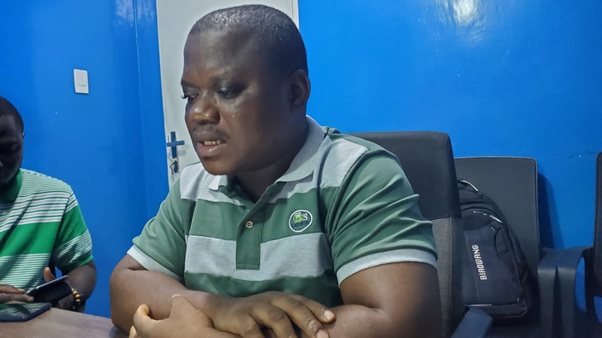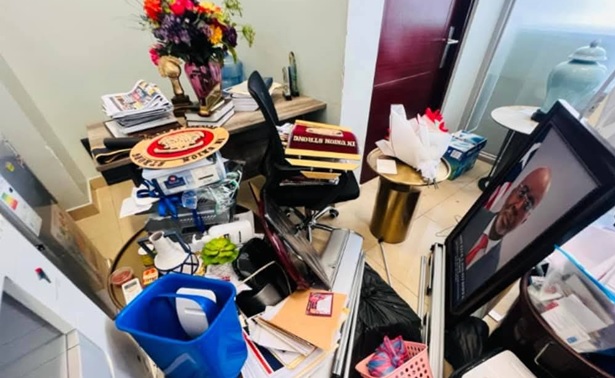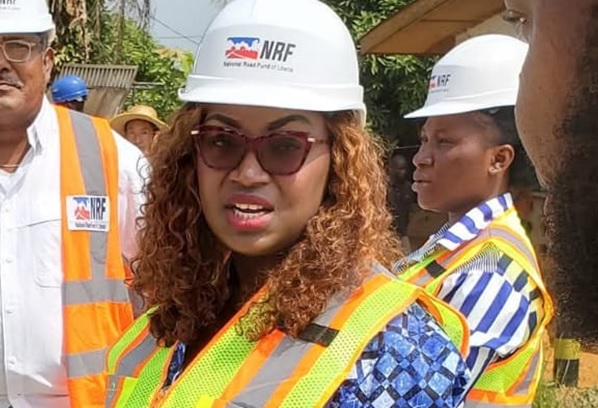MONROVIA – Liberia has made a slight improvement in the latest Corruption Perception Index (CPI) 2024, moving up two places from last year’s ranking, but experts warn that much more needs to be done to address entrenched corruption in the country. The CPI, released by Transparency International, ranks Liberia 141st out of 180 countries, with a score of 27 out of 100, up from 25 in 2023.
At a press conference held on Tuesday, February 11, 2025, at the headquarters of the Center for Transparency and Accountability in Liberia (CENTAL) in Monrovia, Mr. Anderson D. Miamen, Executive Director of CENTAL, discussed the findings and the importance of combating corruption to ensure more sustainable development. Miamen stressed that while the two-point rise was a step forward, Liberia continues to face significant challenges in tackling corruption, which remains one of the highest levels of public sector misconduct globally.
“The marginal increase in Liberia’s CPI score should not be viewed as a victory but rather a reminder that corruption remains rampant, and the country’s future is at risk without drastic reform,” Miamen stated. He highlighted that Liberia’s performance over the years had been disappointing, with the nation dropping by 10 points on the CPI since 2014. This is corroborated by CENTAL’s 2023 State of Corruption report, which reveals that a staggering 90% of Liberians believe corruption levels are high in the country.
The Corruption Perception Index, which measures perceived public sector corruption based on expert evaluations, captures behaviors such as bribery, misuse of public office for private gain, procurement irregularities, and state capture. The CPI also assesses how effective a country’s anti-corruption mechanisms are, including the strength and independence of institutions designed to address corruption. Miamen criticized the weak enforcement of anti-corruption laws in Liberia, emphasizing that the government’s limited efforts to hold officials accountable leave a lot to be desired.
“We have seen some positive steps under the Boakai-Koung government, such as the suspension and dismissal of certain officials accused of corruption,” Miamen said. “However, these actions have been inconsistent, and many high-ranking officials remain in power despite clear indications of misconduct.” He pointed to President Joseph Boakai’s failure to fully sanction some of his non-compliant officials as a sign of partiality, undermining the credibility of the government’s anti-corruption efforts.
Transparency International’s CPI uses data from 13 sources, which includes assessments of bribery, public fund diversion, nepotism, and other forms of corruption in the public sector. The CPI score for 2024 shows that despite the marginal rise, Liberia remains one of the worst performers in Sub-Saharan Africa, and the country’s score is still significantly below the global average of 43.
Miamen emphasized that Liberia’s position on the CPI reflects broader regional challenges in Sub-Saharan Africa, where corruption continues to undermine governance and climate action. He explained, “Saharan Africa is a region that has consistently ranked poorly on the CPI, with systemic corruption being a primary driver of stalled progress. The region’s poor governance structures and impunity for corrupt practices hinder efforts to tackle global challenges like climate change, which is directly tied to mismanagement of resources.”
Liberia, with a CPI score of 27, is among the worst performers in the region, along with countries like Equatorial Guinea and Eritrea. Miamen pointed out that the country’s corruption is not just limited to financial misconduct but extends to systemic issues such as nepotism and lack of accountability in the public sector. He called for comprehensive and impartial anti-corruption reforms, urging the Boakai administration to strengthen institutions such as the Liberia Anti-Corruption Commission (LACC) and the General Auditing Commission (GAC).
“Until we see a stronger commitment from the government to tackle corruption head-on, these incremental changes will remain meaningless,” Miamen said. “The current climate of impunity continues to prevail, and the public’s trust in the executive branch remains dangerously low.”
Sub-Saharan Africa, as a region, has the lowest average CPI score globally, with countries like Somalia, South Sudan, and Equatorial Guinea showing extreme levels of corruption. However, there have been some notable improvements, with countries like Seychelles, Cabo Verde, and Tanzania making strides in improving governance and reducing corruption. Miamen pointed to these examples, urging Liberia to follow suit.
“Liberia can improve its ranking on the CPI, but only if the government is truly committed to rooting out corruption and ensuring that public officials are held accountable for their actions,” Miamen asserted. “It will require strong political will, adequate funding for anti-graft agencies, and a government that is genuinely interested in transparency and good governance.”
Miamen also addressed the broader issue of corruption in climate action efforts, noting that Liberia’s poor CPI score undermines the country’s ability to attract international aid for crucial climate projects. As the world faces an unprecedented climate crisis, corrupt practices threaten to siphon off funds intended for climate adaptation and mitigation. Miamen expressed concern that Liberia, like many African nations, is failing to adequately address the corruption that undermines both national and global efforts to combat climate change.
“Climate finance is crucial for Africa’s development and response to climate change,” Miamen said. “However, without robust anti-corruption mechanisms, these funds may be misappropriated, leaving vulnerable communities without the resources they desperately need.”
He emphasized that Liberia’s future success will depend on the government’s ability to implement tough anti-corruption measures and create an environment where citizens can trust public institutions to act in their best interests. “Ending impunity for corruption, particularly in climate action and governance, is paramount,” Miamen concluded. “Only by tackling corruption head-on can Liberia move forward and build a more sustainable future for its citizens.”
Despite these setbacks, Miamen expressed cautious optimism, urging Liberians to continue pressing for greater accountability. “The fight against corruption is not over. But for it to be successful, we must all demand more from our leaders,” he concluded. “This includes a commitment to transparency, justice, and the fair distribution of resources, which will lead Liberia toward a brighter and more equitable future.”







